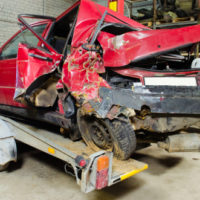Report: Number Of Alcohol-Related Crash Fatalities Essentially Unchanged

In 2017, the number of alcohol-related fatalities in vehicle collisions declined, but only by 1.1 percent.
According to the National Highway Traffic Safety Administration, Uber, Lyft, and other rideshare services were mostly responsible for the decline. Florida MADD director David Pinsker welcomed the news, but not with open arms. “Certainly any decrease is what we want to see. Is it a big enough decrease? Of course not.” Mr. Pinsker said Mothers Against Drunk Driving planned to push for a mandatory ignition interlock device law in Florida. Currently, IIDs are optional in most cases. An IID, which keeps a car from starting if the driver’s BAC is above a certain level, is an effective “fail-safe” in these cases, Mr. Pinsker opined.
Nationally, alcohol-related collisions killed almost 11,000 people in 2017. In contrast, distracted drivers killed about 3,500 people during that same period.
First Party Liability in Port St. Lucie Alcohol-Related Crashes
Most alcohol-related collisions involve DUI arrests, because the tortfeasor (negligent driver) is above the legal limit. In these cases, the negligence per se shortcut usually applies. In traditional negligence cases, the victim/plaintiff must establish five elements to prove the defendant violated the standard of care. But in negligence per se cases, the statute sets the standard of care. So, in these cases, victim/plaintiffs must only prove that:
- The tortfeasor violated a safety law, such as driving under the influence, and
- That violation substantially caused the victim/plaintiff’s injuries.
In some cases, negligence per se is only a presumption of negligence. That’s true in situations that involve traffic ticket and other non-criminal statutes.
Generally, the BAC level is .08. That’s three or four drinks for most people. But drivers are dangerously impaired after the first drink. So, in non-DUI cases, the victim/plaintiff may use circumstantial evidence to establish impairment. This evidence includes things like:
- Erratic driving,
- Bloodshot eyes,
- Odor of alcohol, and
- Impaired motor skills.
The burden of proof in civil cases is only a preponderance of the evidence (more likely than not). Arguably, the circumstantial evidence named above only establishes consumption. But if the tortfeasor consumed alcohol, it is more likely than not that the tortfeasor was also impaired.
Third Party Liability Laws in Florida
In recent years, many states have eliminated their dram shop laws. They claim that third-party liability diminishes personal responsibility for alcohol-related crashes. But Florida’s dram shop law is still one of the strongest ones in the country. Restaurants, bars, and other commercial alcohol providers are vicariously responsible for damages if:
- Under 21: If the provider sold alcohol to a minor and that minor later caused a car crash, the provider is usually liable as a matter of law. The old “s/he looked older” defense is usually inapplicable.
- Habitual Addiction: If the tortfeasor was over 21, the victim/plaintiff must prove the provider knew about a habitual addiction to alcohol. Evidence on this point includes statements the tortfeasor made and prior credit card receipts. Again, the standard of proof is quite low in these cases.
- Foreseeable: If a tortfeasor drinks and then gets behind the wheel, a crash is clearly foreseeable. Crashes are also foreseeable if the tortfeasor bought packaged alcohol. The seller has to assume the tortfeasor might open the package and have a drink.
Social host liability may be available as well, thanks to theories like negligent undertaking.
Count On Aggressive Lawyers
Alcohol-related crashes often involve serious injuries and complex legal issues. For a free consultation with an experienced personal injury attorney in Port St. Lucie, contact Eighmie Law Firm, P.A. Attorneys can connect victims with doctors, even if they have no money or insurance.
Resource:
crashstats.nhtsa.dot.gov/Api/Public/ViewPublication/812603


